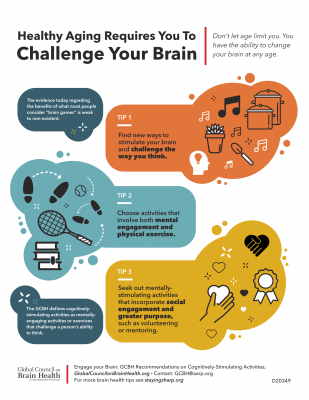AARP Hearing Center
Research shows certain activities can benefit brain health, but brain games not one of them
En español | WASHINGTON, DC—The evidence for the long-term brain health benefits of what most people consider “brain games” is weak to non-existent, according to a new consensus statement issued today by the Global Council on Brain Health (GCBH). The good news is that there are many mentally-engaging activities that can help your brain stay sharp over your lifespan.

“Brain games” can be fun and engaging, but often the claims made by companies touting the benefits of these games are exaggerated. However, there are ways to support and maintain your memory, reasoning skills, and ability to focus, such as engaging in formal or informal educational activities, learning a new language, engaging in work or leisure activities that are mentally challenging, and connecting socially with others.
“The GCBH recommends people incorporate cognitively stimulating activities into their lifestyles to help maintain their brain health as they age,” said Marilyn Albert, Ph.D., GCBH Chair, and Professor of Neurology and Director of the Division of Cognitive Neuroscience at Johns Hopkins University in Baltimore, Maryland. “The sooner you start the better, because what you do now may make you less susceptible to disease-related brain changes later in life.”
Consensus Statement
Based on the scientific evidence, the GCBH concluded that:
- People can influence how their brain changes as they age.
- People can help maintain their memory, thinking, attention and reasoning skills as they age by doing brain-stimulating activities.
- Training on a specific cognitive ability such as memory may improve that ability, but evidence suggests you need to continue to apply that training to maintain or improve the ability over time.
- There is insufficient evidence that getting better at “brain games” will improve people’s overall functioning in everyday life.
- In order to maintain or improve brain health the activity must be: novel, highly engaging, mentally challenging, and enjoyable.
- There is sufficient evidence that brain-stimulating activities are beneficial to staying mentally sharp over your lifespan.
Practical Tips
The GCBH recommends people find new ways to stimulate their brain and challenge the way they think (e.g., learning new skills, practicing tai-chi, taking photography classes, investigating their genealogy). It is also important to participate in mentally-stimulating activities that include social engagement and a purpose in life (e.g., volunteering as a companion and mentoring others in your community). In addition, people should consider physical activities (e.g., dancing or tennis) that involve both mental engagement and physical exercise to improve brain health.
Other tips to engage your brain:
- Choose an activity that you enjoy.
- Pick a skill or hobby that you want to learn and find a friend or companion to help you do it.
- Select activities that fit with your schedule and are easily accessible.
Debunking Brain Myths
Contrary to the many myths about the brain as we age, the GCBH finds:
- You CAN learn new things, no matter your age.
- Dementia is NOT an inevitable consequence of old age.
- Older people CAN learn a second language.
- Older people are NOT doomed to forget things.
“We know that the desire to stay mentally sharp is the number one concern for older adults,” said Sarah Lock, AARP Senior Vice President for Policy, and GCBH Executive Director. “Seeking out brain-stimulating activities is a powerful way for a person to positively influence their brain health as they age.”
About the GCBH
The GCBH, founded in 2015, is an independent international group of scientists, health professionals, scholars and policy experts working on brain health issues. Convened by AARP with support from Age UK, the goal of the GCBH is to review the current scientific evidence and provide recommendations for people so that they can maintain and improve their brain health.
The full GCBH recommendations can be found here: www.globalcouncilonbrainhealth.org
Additional Resources:
# # #
About AARP
AARP is the nation’s largest nonprofit, nonpartisan organization dedicated to empowering Americans 50 and older to choose how they live as they age. With nearly 38 million members and offices in every state, the District of Columbia, Puerto Rico, and the U.S. Virgin Islands, AARP works to strengthen communities and advocate for what matters most to families with a focus on health security, financial stability and personal fulfillment. AARP also works for individuals in the marketplace by sparking new solutions and allowing carefully chosen, high-quality products and services to carry the AARP name. As a trusted source for news and information, AARP produces the world’s largest circulation publications, AARP The Magazine and AARP Bulletin. To learn more, visit www.aarp.org or follow @AARP and @AARPadvocates on social media.































































